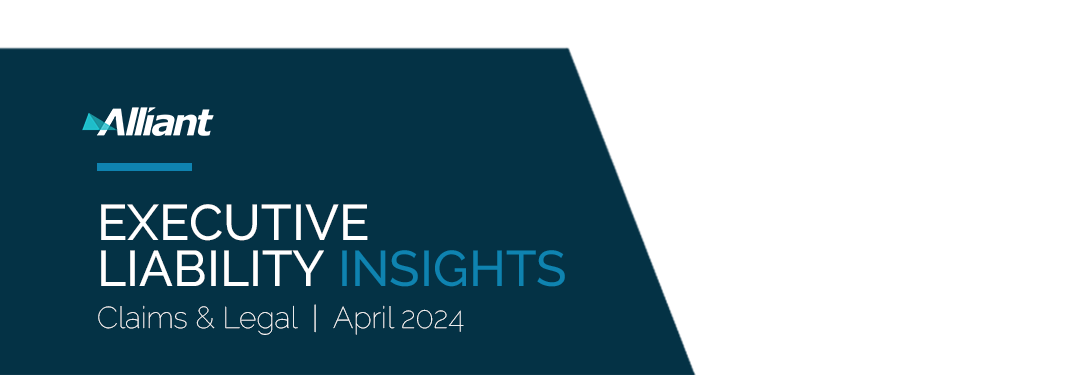
Navigating today’s complex risk environment can be a monumental task. Steve Shappell, Alliant Claims & Legal, spearheads Executive Liability Insights, a monthly review of news, legal developments and information on executive liability, cyber risk, employment practices liability, class action trends and more.


FEATURED ARTICLE
UPDATE: A FEDERAL COURT DECIDES BUMP-UP EXCLUSION BARS COVERAGE UNDER D&O POLICY FOLLOWING A MERGER
Towers Watson & Co. v. Nat’l Union Fire Ins. Co., 1:20-cv-810 (E.D. Va., March 6, 2024).
A Federal Court in Virginia held that merger-related shareholder settlements were not covered by D&O insurance because the settlements triggered the bump-up exclusionary language in the policy.
In This Issue:
INSURERS AVOID COVERAGE BASED ON CHANGES IN EXPOSURE PROVISION
PNC Bank NA v. Axis Insurance Co. et al., Case 2:21-cv-01299 (W.D. Pa. Mar. 13, 2024).
A court held that the “Changes in Exposure” provision precluded coverage for an acquired bank under the acquirer bank’s insurance policies even though the policies defined “predecessors in business” as insureds.
Read More >>
AN INDEMNIFICATION CONTRACT REQUIRES AN OUT-OF-POCKET LOSS
Axis Surplus Ins. Co. v. Aletheia Research & Mgmt., 2024 Cal. App. Unpub. LEXIS 1690 (Mar. 14, 2024).
In a recent decision, a California court ruled in favor of the excess Directors and Officers carrier in holding that its policy was an indemnity contract which required an out-of-pocket loss by the party seeking reimbursement.
Read More >>
SECOND CIRCUIT PRECLUDES COVERAGE UNDER A DUTY TO DEFEND POLICY IF THE BANKRUPTCY/INSOLVENCY EXCLUSION IS TRIGGERED
Daileader v. Certain Underwriters at Lloyds London Syndicate 1861, No. 23-690 2d Cir. (March 18, 2024).
In the underlying litigation, the U.S. government brought a lawsuit against several affiliated healthcare companies (the “Company”) alleging that they had fraudulently been mismanaged. While litigation was pending, the Company defaulted on several loans and appointed an independent director (the “Director”). Eventually, the Company filed for Chapter 7 bankruptcy.
Read More >>
TRIGGERING THE PRIOR ACTS EXCLUSION IS A HIGH BAR FOR INSURERS TO MEET
Xerox Corp. v. Travelers Cas. & Sur. Co. of Am., 2024 N.Y. App. Div. LEXIS 1499 (Mar. 19, 2024).
When denying coverage based on the prior acts exclusion, carriers need to establish that the causes of action asserted in the underlying claim could not exist but for the alleged wrongful acts preceding the prior acts date, an appellate court holds.
Read More >>
EXCESS D&O INSURER’S RELATED CLAIMS ARGUMENT FAILS
Immunomedics, Inc. v. Hudson Ins. Co., 2024 Del. Super. LEXIS 275 (Mar. 18, 2024).
A Delaware court ruled a series of lawsuits were unrelated and, therefore, an excess D&O carrier was required to provide coverage to the Insured. In doing so, the court clarified that establishing “some meaningful linkage” to show that one claim was “arising out of” another one required enough material similarities between the claims.
Read More >>
INSURER SHOULD ACCEPT COVERAGE UNLESS IT IS ABLE TO SHOW THAT COVERAGE IS EXPRESSLY EXCLUDED
Bridlewood Ests. Prop. Owners Ass’n v. State Farm Gen. Ins. Co., 23-cv-00195-AJB-AHG (S.D. Cal. March 18, 2024).
A California District Court held that a carrier unreasonably denied coverage for lack of a wrongful act allegation, while ignoring its own awareness of potential wrongful acts that triggered coverage.
Read More >>
FIFTH CIRCUIT LIMITS THE BROAD APPLICATION OF THE CONTRACT EXCLUSION
SXSW, L.L.C. v. Fed. Ins. Co., 22-50933 (5th Cir. Mar. 21, 2024).
Recently, the Fifth Circuit held that under a duty to defend policy, an insurance carrier owes the duty to defend the Insured when at least one allegation triggers coverage, even if all other allegations trigger broadly worded exclusions.
Read More >>
2ND CIRCUIT RULES PRE-SUIT DEMAND LETTER CONSTITUTES A CLAIM
Pine Mgmt. v. Colony Ins. Co., 2024 U.S. App. LEXIS 7110 (2d Cir. Mar. 26, 2024).
An attorney representation letter with allegations, a document production demand, and a request for repayment received by an Insured prior to the filing of a lawsuit constitutes a claim under a claims-made liability insurance policy.
Read More >>
NON-PARTY TO PROFESSIONAL LIABILTIY POLICY CANNOT SEEK CONTRIBUTION FROM INSURER
S-R Invs. LLC v. Fed. Ins. Co., 2024 U.S. Dist. LEXIS 58886 (N.D. Ill. Mar. 30, 2024).
Recently, a court ruled a non-party to a Professional Liability insurance policy has no legal right to seek equitable contribution or subrogation from the insurer. A real estate investment company (the “Company”) accused its management company (the “Manager”) of breach of contract and fiduciary duties sparking litigation.
Read More >>
CYBER CORNER
Click to read the following cases:
- FINANCIAL SERVICES INDUSTRY BECOMING PRIME TARGET FOR DISTRIBUTED-DENIAL-OF-SERVICE ATTACKS
- NEW CYBER INCIDENT REPORTING REQUIREMENTS ON THE HORIZON FOR CRITICAL INFRASTRUCTURE ENTITIES
- INSURERS’ ABILITY TO SEEK SUBROGATION DEPENDS UPON CONTRACT AND POLICY WORDING
Read More >>
SECURITIES CORNER
Click to read the following cases:
- SEC CONTINUES TO CRACK DOWN ON COMPANIES MISLEADING INVESTORS
- AS PART OF AN SEC SWEEP, TWO INVESTMENT FIRMS SETTLE ACTIONS FOLLOWING ALLEGATIONS OF PUBLICALLY MISCHARACTERIZING THEIR USE OF ARTIFICIAL INTELLIGENCE (“AI”)
- SEC CONTINUES TO PENALIZE INVESTMENT ADVISERS THAT FAIL TO DISCLOSE MATERIAL CONFLICTS OF INTEREST
- MARCH 2024 NOTEWORTHY ENFORCEMENT ACTIONS FILED
- MARCH 2024 NOTEWORTHY SETTLEMENTS AND JUDGEMENTS
Read More >>
SHAREHOLDER CORNER
Click to read the following cases:
- MARCH 2024 SECURITIES CLASS ACTION FILINGS
Read More >>
UPDATE: A FEDERAL COURT DECIDES BUMP-UP EXCLUSION BARS COVERAGE UNDER D&O POLICY FOLLOWING A MERGER
Towers Watson & Co. v. Nat’l Union Fire Ins. Co., 1:20-cv-810 (E.D. Va., March 6, 2024).


A Federal Court in Virginia held that merger-related shareholder settlements were not covered by D&O insurance because the settlements triggered the bump-up exclusionary language in the policy.
In the May 2023 publication, Alliant summarized the appellate court’s decision with respect to ongoing coverage litigation arising from the D&O carriers’ refusal to fund large settlements resulting from two inadequate consideration class action complaints. The appellate court held that the D&O policy’s clear and unambiguous language supported the conclusion that the type of transaction at issue and the parties involved fell within the scope of the bump-up exclusion.
Following the appellate court’s decision, the carriers argued that the “underlying complaints repeatedly alleged that the consideration received by [shareholders] for the merger was inadequate.” Furthermore, the carriers pointed that settlement losses in connection with claims against the insured sought an increase or “bump up” in the consideration paid for it are uncovered Loss. The Insured counter-argued that the settlements served other purposes beyond the scope of the merger price and, therefore, the damages paid did not “effectively increase” the merger consideration. Additionally, the Insured argued that at least a portion of the settlement should be covered (the portion attributed to fees, taxes, and administrative costs).
The court held that the allegations of inadequate consideration “were the basis for the harms” underlying the claims; therefore, the subject complaints “necessarily alleged inadequate consideration, thus invoking the [bump-up] exclusion.” The court further determined that the entirety of the settlement was paid into one “common fund” for shareholders and, thus, the whole settlement amount was excluded.
INSURERS AVOID COVERAGE BASED ON CHANGES IN EXPOSURE PROVISION
PNC Bank NA v. Axis Insurance Co. et al., Case 2:21-cv-01299 (W.D. Pa. Mar. 13, 2024).


A court held that the “Changes in Exposure” provision precluded coverage for an acquired bank under the acquirer bank’s insurance policies even though the policies defined “predecessors in business” as insureds.
Following an acquisition of another bank, the acquirer bank was sued for the acquired bank’s mismanagement of trust accounts which occurred years before the purchase transaction. The insured bank sought coverage, arguing that its financial institution professional liability coverage included "predecessors in business" in the definition of Insured.
The policy contained the Changes in Exposure Provision which stated:
If, during the Policy Period: (i) an organization or entity becomes a Subsidiary, or (ii) the Company acquires any organization or entity by merger into or consolidation with the Company, then coverage shall apply to such organization or entity and the Insureds of such organization or entity, but only with respect to Wrongful Act(s) committed, attempted, or allegedly committed or attempted, at the time of or after such event, unless the Underwriter agrees, after presentation of all appropriate information, to provide coverage by endorsement for Wrongful Act(s) by such Insureds prior to such event.
However, the insurers argued that the “Changes in Exposure” provision excluded coverage for wrongful acts committed by the acquired bank prior to the transaction. The court agreed and found that a plain reading of the policy clearly and unambiguously precluded coverage for actions occurring prior to the transaction and coverage applied only to wrongful acts at the time of acquisition or after.
The Takeaway:
This case highlights the importance of carefully drafting policy language. If parties choose to forego purchasing runoff coverage in anticipation that the acquirer’s insurers will cover the prior acts of acquired entities, then it must be clearly constructed to avoid these gaps in coverage. It is essential that the insured’s expectations are communicated to the carriers to ensure the proper coverage can be negotiated and structured.
AN INDEMNIFICATION CONTRACT REQUIRES AN OUT-OF-POCKET LOSS
Axis Surplus Ins. Co. v. Aletheia Research & Mgmt., 2024 Cal. App. Unpub. LEXIS 1690 (Mar. 14, 2024).


In a recent decision, a California court ruled in favor of the excess Directors and Officers carrier in holding that its policy was an indemnity contract which required an out-of-pocket loss by the party seeking reimbursement.
When the Insured sought coverage for its directors and officers, the carrier denied it for late notice and other reasons. Coverage litigation ensued. The court denied the carrier’s motion for summary judgment and ordered the parties to resolve certain issues during a bench trial. While proceeding with the bench trial, the insured filed for bankruptcy and entered into a settlement for the suit for which it needed insurance coverage. The settlement of the underlying suit expressly excluded directors and officers from release. During the bench trial between the carrier and the Insured, the court held that the policy at issue was an indemnity policy which would be triggered only if the Insured paid the directors indemnity for legal expenses. At the time, the Insured’s bankruptcy trustee appealed the trial court’s holding.
The trustee for the Insured argued that the trial court erred in interpreting the policy as an indemnification contract. Instead, the trustee invited the court to recognize that the policy at issue was a liability contract which required the carrier to cover the Insured when liability attached. The trustee argued that the policy was ambiguous because it provided that “[the carrier] shall pay on behalf of [the Insured],” while simultaneously suggesting that the carrier could not pay an obligation on behalf of its Insured, unless the Insured pays the obligation first. According to the trustee, such ambiguity needed to be interpreted in favor of the Insured; however, the appellate court disagreed.
The appellate court pointed that the title of the policy at issue provided that it was an “insured adviser professional and management liability insurance and corporate reimbursement” policy. Therefore, the word “reimbursement” required the Insured to bear an out-of-pocket loss. The court interpreted the word “reimburse” to mean “to pay back to someone,” and held that the policy’s language was unambiguous.
SECOND CIRCUIT PRECLUDES COVERAGE UNDER A DUTY TO DEFEND POLICY IF THE BANKRUPTCY/INSOLVENCY EXCLUSION IS TRIGGERED
Daileader v. Certain Underwriters at Lloyds London Syndicate 1861, No. 23-690 2d Cir. (March 18, 2024).
In the underlying litigation, the U.S. government brought a lawsuit against several affiliated healthcare companies (the “Company”) alleging that they had fraudulently been mismanaged. While litigation was pending, the Company defaulted on several loans and appointed an independent director (the “Director”). Eventually, the Company filed for Chapter 7 bankruptcy.


Following bankruptcy, a bankruptcy trustee (the “Trustee”) sent a demand letter to the Director alleging that the Director had breached their fiduciary duties to the Company by failing to file for Chapter 11 Restructuring and initiated an adversary proceeding. The Trustee alleged that the Director “made no attempt to coordinate a sale or refinance of the Debtors and did not even begin a corporate restructuring.” In short, the Trustee alleged that the Director’s wrongful acts caused the Company to file for Chapter 7 bankruptcy.
The Director sought coverage from the D&O tower. Under a duty to defend policy, the primary carrier agreed to defend the Director in the adversary proceeding. However, after the primary carrier’s limits had been exhausted, the excess carrier (the “Carrier”) denied coverage invoking the policies’ Bankruptcy/Insolvency Exclusion (the “Exclusion”). The Exclusion eliminated coverage for “Claims” against the Company that were “alleging, arising out of, based upon, attributable to, or in any way involving, directly or indirectly, in whole or in part” certain wrongful acts.
The issue before the court was whether the adversary proceeding was a Claim that was excluded from coverage. The Director argued that if the policy provided coverage against any of the Trustee’s causes of action, then the Carrier had the broad duty to defend all causes of action. However, the Carrier argued that if the policy excluded from coverage any of the Trustee’s causes of action, then the Carrier had no duty to defend the Director against any of the underlying claims due to the broad exclusion.
The court agreed with the Carrier and pointed that the policy defined “Claim” as a “civil . . . proceeding,” as opposed to defining it as a cause of action within a proceeding. Moreover, the Exclusion applied to “any Claim alleging, arising out of, based upon, attributable to, or in any way involving, directly or indirectly, in whole or in part, any” otherwise excluded “Wrongful Act.” Thus, the adversary proceedings were the civil proceedings arising in part out of otherwise-excluded conduct—precisely what the Exclusion contemplated.
TRIGGERING THE PRIOR ACTS EXCLUSION IS A HIGH BAR FOR INSURERS TO MEET
Xerox Corp. v. Travelers Cas. & Sur. Co. of Am., 2024 N.Y. App. Div. LEXIS 1499 (Mar. 19, 2024).


When denying coverage based on the prior acts exclusion, carriers need to establish that the causes of action asserted in the underlying claim could not exist but for the alleged wrongful acts preceding the prior acts date, an appellate court holds.
In the case at issue, a Corporation’s Directors and Officers Liability insurance policies contained an exclusion for any "Claim . . . based upon, arising from, or in consequence of any fact, circumstance or Wrongful Act committed, attempted, or allegedly committed or attempted in whole or in part prior to [the prior acts date]."
Two months after the prior acts date, multiple shareholders filed a lawsuit opposing the purchase of the Corporation. The suit asserted a breach of fiduciary duty, malfeasance of the board in undervaluing the Corporation, and failure to follow an open bidding process. The Corporation provided notice of the lawsuit to its D&O carriers. After the primary and the first excess carriers contributed their policy limits to the settlement and related defense costs, the Corporation submitted the invoices to the second excess carrier (the “Carrier”). The Carrier denied coverage, citing the Prior Acts exclusion. Coverage litigation ensued.
The appellate court reversed a lower court and ruled in favor of the Corporation, clarifying that the Carrier failed to show that “none of the causes of action [the shareholders] assert[] could exist but for the existence of the excluded activity.” According to the court, the acts giving rise to liability were the negotiations and the approval of the allegedly disadvantageous transaction, the Corporation’s denial of a request to waive the deadline for advance notice of director nominations (taking place after the prior acts date). The complaints also alleged that the former CEO and its directors breached their fiduciary duties by agreeing to a self-serving, rushed, and unfavorable transaction—all causes of action that could have been viable even if the Corporation had not previously entered the joint venture with the purchaser. In ruling in favor of the Corporation, the appellate court reversed the lower court, stating that the latter should have granted the Corporation’s motion for summary judgment on the issue as a matter of law.
EXCESS D&O INSURER’S RELATED CLAIMS ARGUMENT FAILS
Immunomedics, Inc. v. Hudson Ins. Co., 2024 Del. Super. LEXIS 275 (Mar. 18, 2024).


A Delaware court ruled a series of lawsuits were unrelated and, therefore, an excess D&O carrier was required to provide coverage to the Insured. In doing so, the court clarified that establishing “some meaningful linkage” to show that one claim was “arising out of” another one required enough material similarities between the claims.
In the case at issue, a biotechnology company (the “Company”) faced several securities class action lawsuits over a period of years stemming from the development of one of its cancer treatments. The Company sought and received coverage under its D&O insurance policy for an earlier lawsuit. After exhaustion of the primary and first two excess carriers, the third excess carrier (the “Carrier”) refused to continue defending the matter. The Carrier argued that the claim was related to a prior lawsuit; therefore, the claim at issue has been made under a prior Policy Period. According to that Carrier, there was a sufficient connection between the two suits to trigger the Related Claims provision and Prior Notice exclusion.
The primary policy defined Related Claim as "a Claim alleging, arising out of, based upon or attributable to any facts or Wrongful Acts that are the same as or related to those that were . . . alleged in a Claim made against an Insured." The Prior Notice exclusion precluded coverage for any Claim “that has been reported . . . under any directors and officers liability insurance policy in force prior to the inception date of this policy.”
Under Delaware law, "arising out of" means to share "some meaningful linkage.” In determining whether “some meaningful linkage” existed between the two actions the court considered: (1) the parties, (2) the relevant time periods, (3) the overall theory of liability, (4) sampling of relevant evidence, and (5) the claimed damages. Ultimately, the court determined the suits were unrelated, finding that there was no meaningful link between the lawsuits because they involved different parties, time periods, theories of liability, evidence, and relief sought.
INSURER SHOULD ACCEPT COVERAGE UNLESS IT IS ABLE TO SHOW THAT COVERAGE IS EXPRESSLY EXCLUDED
Bridlewood Ests. Prop. Owners Ass’n v. State Farm Gen. Ins. Co., 23-cv-00195-AJB-AHG (S.D. Cal. March 18, 2024).


A California District Court held that a carrier unreasonably denied coverage for lack of a wrongful act allegation, while ignoring its own awareness of potential wrongful acts that triggered coverage.
In the underlying litigation, a non-profit planned community corporation (the “Corporation”) was insured under a Residential Community Association Policy. The Policy included a directors and officers endorsement (the “Endorsement”) providing liability coverage for wrongful acts of the Corporations directors and officers.
The Corporation received an email with an invoice from a third-party seeking payment for repairs. The email provided wiring instructions and explained that the third-party was moving from check payments to direct wire transfers. The Corporation’s treasurer (the “Treasurer”) sent the payment. Unbeknownst to the Corporation, the wiring instructions were sent by a fake email address and the payment never reached the third-party. As a result, the Corporation never paid to third-party. Later, the third-party demanded the payment, placed a lien on the Corporation’s property, and filed a complaint against the Corporation, alleging breach of contract. The Corporation tendered the lien and the complaint to its carrier and sought coverage under the Endorsement.
The Endorsement stated that the carrier “will pay those sums that the insured becomes legally obligated to pay as damages because of a ‘wrongful act’ to which this endorsement applies.” Furthermore, the Endorsement, defined Wrongful Act to mean “any actual or alleged error, misstatement, misleading statement, act, omission, neglect, or breach of duty committed, attempted or allegedly committed or attempted by an insured arising solely out of his or her capacity as director, officer ‘manager’ or trustee relating to the operations of your organization.”
The carrier argued there was no coverage because the complaint lacked a “wrongful act.” The court disagreed and stated that when comparing the allegations in the third-party complaint and the terms of the Endorsement, the third-party’s breach of contract claim was not expressly excluded from coverage. The court proceeded to explain that the Endorsement did not exclude contractual liabilities from coverage, despite delineating 19 other exclusions. Additionally, extrinsic evidence known to the carrier, suggested that the Treasurer committed a “wrongful act” when they made a mistake in transmitting the payment. As such, the carrier’s attempt to cast the Treasurer’s payment error as irrelevant to the breach of contract claim was unavailing.
FIFTH CIRCUIT LIMITS THE BROAD APPLICATION OF THE CONTRACT EXCLUSION
SXSW, L.L.C. v. Fed. Ins. Co., 22-50933 (5th Cir. Mar. 21, 2024).


Recently, the Fifth Circuit held that under a duty to defend policy, an insurance carrier owes the duty to defend the Insured when at least one allegation triggers coverage, even if all other allegations trigger broadly worded exclusions.
Each year a media conglomerate (the “Company”) hosts a festival, but due to the COVID-19 pandemic, the Company canceled the festival which led to ticket holders seeking a refund for their purchases. The Company declined citing the no-refund clause in the ticket agreement. As a result, the ticket holders filed a class action lawsuit against the Company alleging breach of contract, unjust enrichment, and conversion. The lawsuit eventually settled. Following the settlement, the Company attempted to shift the costs onto its insurance carrier (the “Carrier”). The Carrier responded noting that it would neither defend nor indemnify the Company citing both the Contract and Professional Services Exclusion. The Company sued the Carrier.
The Contract Exclusion stated the Carrier “shall not be liable for Loss on account of any Claim against an Organization: . . . based upon, arising from or in consequence of any liability in connection with any oral or written contract or agreement to which an Organization is a party . . . .” The Carrier argued that this exclusion precluded coverage because but-for the ticket purchase contracts, no purchaser litigation would have ever occurred. The Company, however, offered a different interpretation, focusing on the phrase “liability in connection with any . . . contract.” In relying on this language, the Company argued that because the complaint also alleged unjust enrichment and conversation—claims “wholly outside any contract or agreement,” the Contract Exclusion did not bar coverage. The court agreed with he Company and held that since at least one allegation survived the Contract Exclusion, the Carrier “must defend the entire suit.”
Next, the Carrier argued the Professional Services Exclusion precluded coverage. The Exclusion stated that the Carrier “shall not be liable for loss on account of any Claim against an Organization: . . . based upon, arising from, or in consequence of: . . . the rendering of, or failure to render, and Professional Services by an Insured.” The Company argued that “professional services” might include the Company’s actions in putting on (or failing to put on) the festival. But “professional services” did not extend to the Company’s actions in refunding or not refunding ticket purchases which were not services the Company performed for a fee. The court agreed. Specifically, the court opined that refusing to provide refunds for the canceled festival did not constitute “professional services.”
2ND CIRCUIT RULES PRE-SUIT DEMAND LETTER CONSTITUTES A CLAIM
Pine Mgmt. v. Colony Ins. Co., 2024 U.S. App. LEXIS 7110 (2d Cir. Mar. 26, 2024).


An attorney representation letter with allegations, a document production demand, and a request for repayment received by an Insured prior to the filing of a lawsuit constitutes a claim under a claims-made liability insurance policy.
A real estate management company (the “Company”) that acquires, manages, and develops rental apartment buildings purchased a professional liability insurance policy. A client of the Company filed suit alleging the Company had mismanaged its buildings. The complaint referenced an attorney representation letter (the “Letter”) that was issued to the Company prior to the litigation, which the insurer seized on as notice of a claim made before the inception of its policy and denied coverage.
The policy defined “Claim” to include “a written demand received by [the Company] for monetary, nonmonetary or injunctive relief” and arising from a “Wrongful Act,” which is defined as "any actual or alleged act, error, omission or breach of duty by [the Company] in the rendering of or failure to render Real Estate Development Services."
The Company argued the Letter was not a Claim because it did “not contain a sufficiently clear demand for relief and because it [was] framed in precatory language that failed to put [the Company] on proper notice of the demand.” The court disagreed, finding the Letter put the Company on notice that its client sought relief to remedy the Company’s alleged wrongdoing. Specifically, the Letter contained allegations that the Company breached its fiduciary duty, failed to disclose material facts, and breached provisions of the management agreement, and demanded document production as well as repayment of unauthorized transfers the Company made to itself.
This case highlights the importance of contacting your broker upon receipt of any correspondence that, even remotely, resembles a demand. Even if a carrier may be unwilling to accept a given notice as a Claim, it is essential to timely tender such correspondence to Insurer to avoid costly litigation over a late notice issue.
NON-PARTY TO PROFESSIONAL LIABILITY POLICY CANNOT SEEK CONTRIBUTION FROM INSURER
S-R Invs. LLC v. Fed. Ins. Co., 2024 U.S. Dist. LEXIS 58886 (N.D. Ill. Mar. 30, 2024).


Recently, a court ruled a non-party to a Professional Liability insurance policy has no legal right to seek equitable contribution or subrogation from the insurer. A real estate investment company (the “Company”) accused its management company (the “Manager”) of breach of contract and fiduciary duties sparking litigation. Pursuant to the parties’ management agreement, the Company was required to advance the Manager’s defense costs for the dispute. After the Company began advancing defense costs, it discovered the Manager had a D&O policy that would be triggered by the dispute.
The Company sued the Insurer seeking equitable contribution and subrogation to recoup the advanced defense costs arguing the Insurer was primarily liable to advance defense costs with the Company only secondarily liable. The court disagreed. Although under Illinois law, contribution may apply to parties with a joint financial obligation, and is not limited solely to coinsurers, here, the Company and Insurer did not jointly agree to be responsible for the defense costs. Rather each entered into independent agreements with the Manager, which did not incorporate one another. Further, the contract failed to state anything about secondary liability, while the policy explicitly stated its coverage was independent of others that may be liable to the Manager. Therefore, the Company cannot seek contribution from the Insurer.
Similarly, as the agreement and policy are independent of each other, the Company could not establish that it was "secondarily liable" for the advancement of defense costs to the Manager. The agreement created a freestanding obligation for the Company to advance defense costs irrespective of the Manager’s rights to seek recovery from other parties, including explicitly from insurance, and therefore have no claim for subrogation.
Cyber Corner
FINANCIAL SERVICES INDUSTRY BECOMING PRIME TARGET FOR DISTRIBUTED-DENIAL-OF-SERVICE ATTACKS
A recent increase in Distributed Denial-of-Service (“DDoS”) attacks on the financial services industry has damaged customer confidence in businesses impacted by these events. DDoS attacks are frequently used by threat actors as decoys and open the door for these actors to inflict more damage. DDoS attacks flood the targeted organization’s network with extraneous internet traffic, causing systems to crash and halting e-commerce.
NEW CYBER INCIDENT REPORTING REQUIREMENTS ON THE HORIZON FOR CRITICAL INFRASTUCTURE ENTITIES
On March 27, 2024, the U.S. Cybersecurity and Infrastructure Security Agency (CISA) published a Notice of Proposed Rulemaking under the Cyber Incident Reporting for Critical Infrastructure Act (CIRCIA), a federal law enacted in 2022. These rules are in draft form and do require covered entities to report any incidents until 60 days after a Final Rule is published, which is not likely to occur until 2026.
INSURERS’ ABILITY TO SEEK SUBROGATION DEPENDS UPON CONTRACT AND POLICY WORDING
Travelers Casualty and Surety Company of America v. Blackbaud, Inc., N22C-12-130 KMM, N22C-12-141 KMM, (Del Super. Ct. Mar. 27, 2024).
In a recent decision, a Delaware court dismissed lawsuits brought against a software service provider (the “Software Provider”) who suffered a ransomware attack. This attack compromised the customer data of many of the Software Provider’s corporate clients.
Securities Corner
SEC CONTINUES TO CRACK DOWN ON COMPANIES MISLEADING INVESTORS
Following a recent sweep by the SEC of EV startups that went public via mergers with blank-check companies, the SEC settled with the founder and former CEO of a bankrupt EV startup (the “Company”).
AS PART OF AN SEC SWEEP, TWO INVESTMENT FIRMS SETTLE ACTIONS FOLLOWING ALLEGATIONS OF PUBLICALLY MISCHARACTERIZING THEIR USE OF ARTIFICIAL INTELLIGENCE (“AI”)
As part of the SEC’s ongoing AI sweep targeting investment advisers and how they characterize their use of AI, the SEC has commenced two first-of-their kind enforcement actions. These actions have been brought against two investment firms (the “firms”) who made false statements and misled the public about how they used AI.
SEC CONTINUES TO PENALIZE INVESTMENT ADVISERS THAT FAIL TO DISCLOSE MATERIAL CONFLICTS OF INTEREST
Recently, a Massachusetts federal judge found that a privately held Registered Investment Adviser (the “Company”) negligently failed to disclose material conflicts of interest to its advisory clients and failed to adopt and implement policies and procedures as required by the Advisers Acts.
|
Director/Officer |
Role |
Company |
|
Roy Cook |
Director |
Tallgrass Energy LP |
|
Stephen Scott Burns |
Founder/ CEO |
Lordstown Motors Corp. |
|
Andreas Bechtolsheim |
Founder |
Arista Networks, Inc. |
|
Director/Officer |
Role |
Company |
|
Roy Cook |
Director |
Tallgrass Energy LP |
|
Stephen Scott Burns |
Founder/ CEO |
Lordstown Motors Corp. |
|
Andreas Bechtolsheim |
Founder |
Arista Networks, Inc. |
MARCH 2024 NOTEWORTHY SETTLEMENTS AND JUDGMENTS
|
Amount |
Director/Officer |
Role |
Company |
|
$46,831 |
Imran Parekh |
Director |
Evoqua Water Technologies Corp. |
|
$441,024.16 |
Bernard Finley |
CFO |
Hailtron, Inc. |
|
Amount |
Director/Officer |
Role |
Company |
|
$46,831 |
Imran Parekj |
Director |
Evoqua Water Technologies Corp. |
|
$441,024.16 |
Bernard Finley |
CFO |
Halitron, Inc. |
Source: U.S. Securities and Exchange Commission
https://www.sec.gov/litigation/admin.htm
Source: Stanford Law School Securities Class Action Clearinghouse
ABOUT ALLIANT INSURANCE SERVICES
Alliant Insurance Services is the nation’s leading specialty broker. In the face of increasing complexity, our approach is simple: hire the best people and invest extensively in the industries and clients we serve. We operate through national platforms to all specialties. We draw upon our resources from across the country, regardless of where the resource is located.
Contributors


Abbe Darr, Esq.
Claims Attorney
abbe.darr@alliant.com
David Finz, Esq.
Claims Attorney
david.finz@alliant.com
Isabel Arustamyan, Esq.
Claims Attorney
isabel.arustamyan@alliant.com
Jacqueline Vinar, Esq.
Claims Attorney
jacqueline.vinar@alliant.com
Jaimi Berliner, Esq.
Claims Attorney
jaimi.berliner@alliant.com
Karina Montoya, J.D.
Claims Advocate
karina.montoya@alliant.com
Malia Shappell, Esq.
Claims Attorney
malia.shappell@alliant.com
Michael Radak, Esq.
Claims Attorney
michael.radak@alliant.com
Peter Kelly, Esq.
Claims Attorney
peter.kelly@alliant.com
Robert Aratingi
Senior Claims Advocate
robert.aratingi@alliant.com
Steve Levine, Esq.
Claims Attorney
slevine@alliant.com